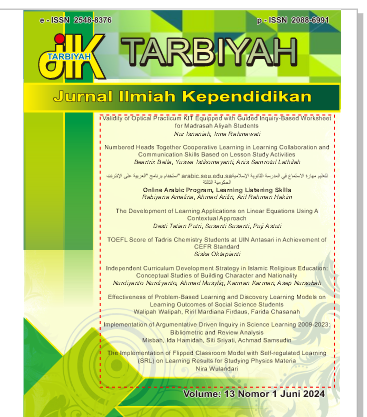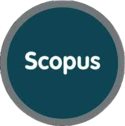Effectiveness of Problem-Based Learning and Discovery Learning Models on Learning Outcomes of Social Science Students
DOI:
https://doi.org/10.18592/tarbiyah.v13i1.12848Keywords:
discovery learning , learning outcomes , problem based learning , social scienceAbstract
Research will be conducted to determine the description of the problem-based learning and discovery learning models to improve student learning outcomes, the differences in cognitive and affective learning outcomes between experimental and control classes, and the effectiveness of the problem-based learning and discovery learning models in improving student learning outcomes—quantitative research with an experimental nonequivalent control group design. The population is class VII students of SMP (Junior High School) Negeri 1 Bululawang 2023/2024, totaling 52 students. The sampling technique uses saturated sampling. Data collection uses test and observation techniques. Data analysis techniques use the t-test and Manova test. The research results showed that the effectiveness of the experimental class compared to the control class was 0.032, thus stating that Ha was accepted. The implications of this research show that learning Social Sciences, which has been considered rote, can become applied science using the Problem-Based Learning model.References
A, Syaifi; S, Murwitaningsih. (2022). Analysis of the Influence of Problem Based Learning Models Assisted by Wordwall Media on Science Learning Outcomes of Primary School Students. Journal Paedagogy, 755-756
Amin, A. K., Degeng, N. S., Setyosari, P., & Djatmika, E. T. (2021). The Effectiveness of 68 Dani, Rahmawati, & Aini, Efektifitas Model Pembelajaran … Mobile Blended Problem Based Learning on Mathematical Problem Solving. International Journal of Interactive Mobile Technologies, 15(1). https://doi.org/10.3991/IJIM.V15I01.17437
Aslon, A. (2021). Problem-Based Learning in Live Online Classses: Learning Achievement, Problem-Solving Skill, Communication Skill, and Interaction. Computers & Education, (Online), 171(1), (https://doi.org/10.1016/j.compedu.2021.104), diakses 14 Januari 2024.
Burhendi, F. C. A., Dian, W. L., Kusdiwelirawan, A. & Sagita, D. D. (2019). Implementation of Blended Learning to Use Discovery Learning Method. International Journal of Innovation, Creativity and Change, (Online), 5(6): 153-163, (http://www.ijicc.net), diakses 11 Januari 2024.
Fidon, M. & Tuncel, M. (2019). Integrating Augmented Reality into Problem Based Learning: The Effect on Learning Achievement and Attitude in Physics Education. Computers & Education, (Online), 142(1), (https://doi.org/10.1016/j.compedu.2019.103635), diakses 14 Januari 2024.
Hikmawati, H., Kosim, K., Doyan, A., Gunawan, G. & Kurniawan, E. (2020). Discovery Learning Model to Practise Students’ Science Process Skill in Elasticity and Hooke’s Law. Journal of Physics: Conf. Series, (Online), 1779(012087): 1-7, (https://doi.org/10.1088/1742-6596/1779/012087), diakses 14 Januari 2024.
Ilhan, A., & Ekber Gülersoy, A. (2019). Discovery learning strategy in geographical education: A sample of lesson design. Review of International Geographical Education Online, 9(3). https://doi.org/10.33403/rigeo.672975
Inayah, Z., Buchori, A. & Pramasdyahsari, A. S. (2021). The Effectiveness of PBL and PjBL Assisted Kahoot Learning Models on Student Learning Outcomes. International Journal of Research in Education, 1(2): 129-137.
Kaharuddin, A. (2018). Effect of Problem Based Learning Model on Mathematical Learning Outcomes of 6th Grade Students of Elementary School Accredited B in Kendari City. International Journal of Trends in Mathematics Education Research, (Online), 1(2): 43-46, (http://ijtmer.com), diakses 11 Januari 2024.
Komala, R., Heryanti, E. & Rinawati, A. (2021). Effect of Problem-Based Learning Model on Biodiversity Problem-Solving Skills. Biosfer, (Online), 14(1): 120-131, (https://doi.org/ 10.21009/biosferjpb.16325), diakses 12 Januari 2024.
Mulyanto, H., Gunarhadi & Indriayu, M. (2018). The Effect of Problem Based Learning Model on Student Mathematics Learning Outcomes Viewed from Critical Thinking Skills. International Journal of Educational Research Review, (Online), 3(2): 37-45, (http://www.ijere.com), diakses 11 Januari 2024.
Mustikaningrum, G., Widiyanto & Mediatati, N. (2021). Application of the Discovery Learning Model Assisted by Google Meet to Improve Students' Critical Thinking Skills and Science Learning Outcomes. International Journal of Elementary Education, (Online), 5(1): 30-38, (https://ejournal.undiksha.ac.id/index.php/IJEE), diakses 11 Januari 2024.
Permatasari, B. D., Gunarhadi & Riyadi. (2019). The Influence of Problem Based Learning towards Social Science Learning Oucomes Viewed from Learning Interest. International Journal of Evaluation and Research in Education (IJERE), (Online), 8(1): 39-46, (http://iaescore.com/journals/index.php/ IJERE), diakses 11 Januari 2024.
Pursitasari, I. D., Suhardi, E. & Sunarti, T. (2019). Promoting Science Literacy with Discovery Learning. Journal of Physics: Conf. Series, (Online), 1233(012074): 1-6, (https://doi.org/10.1088/1742-6596/1233/012074), diakses 14 Januari 2024.
Purwaningsih, E., Sari, S. P., Sari, A. M. & Suryadi, A. (2020). The Effect of STEM-PjBL and Discovery Learning on Improving Students’ Problem-Solving Skills of Impulse and Momentum Topic. Indonesian Journal of Science Education, (Online), 9(4), 465-476, (https://doi.org/10.15294/ jpii.v9i4.26432), diakses 12 Januari 2024.
Putriani, d. & Rahayu, C. (2018). The Effect of Discovery Learning Model using Sunflowers in Circles on Mathematics Learning Outcomes. International Journal of Trends in Mathematics Education Research, (Online), 1(1): 22-25, (http://ijtmer.com), diakses 11 Januari 2024.
Ristanta, R., Sabrina, A. & Komala, R. (2022). Critical Thinking Skills of Environmental Changes: A Biological Instruction using Guided Discovery Learning-Argument Mapping (GDL-AM). Participatory Educational Research, (Online), 9(1): 173-191, (https://doi.org/10.17275/ per.22.10.9.1), diakses 14 Januari 2024.
Sari, Y. I., Sumarmi, Utomo, D. H., & Astina, I. K. (2021). The Effect of Problem Based Learning on Problem Solving and Scientific Writing Skills. International Journal of Instruction, 14(2). https://doi.org/10.29333/iji.2021.1422a
Setyaningrum, W., Riani, A. L. & Wardani, D. K. (2020). Comparison of Problem-Based Learning and Discovery Learning Model. International Journal of Multicultural and Multireligious Understanding, (Online), 7(3): 305-313, (http://dx.doi.org/10.18415/ijmmu.v7i3.1564), diakses 11 Januari 2024.
Simanjuntak, M. P., Hutahaean, J., Marpaung, N., & Ramadhani, D. (2021). Effectiveness of problem-based learning combined with computer simulation on students’ problemsolving and creative thinking skills. International Journal of Instruction, 14(3)
Sugiarti, & Husain, H. (2021). An influence of the contextual-based discovery learning model on the academic honesty of high school students. International Journal of Instruction, 14(3). https://doi.org/10.29333/iji.2021.14338a
Syaifulloh, M., Indana, S. & Agustini, R. (2022). Profile of the Implementation of Discovery Learning Model in Science Learning. IJORER: International Journal of Recent Educational Research, (Online), 3(1): 71-87, (https://doi.org/10.46245/ijorer.v3i1.187), diakses 11 Januari 2024.
Syarifah, R. & Ritonga, W. (2020). Application of Problem Based Learning Model on Students’ Learning Outcomes on Momentum and Impluse Materials. IPER (Indonesian Physics Education Research), (Online), 1(1): 19-26, (https://doi.org/10.24114/iper.v1i1.14193), diakses 14 Januari 2024.
Timor, A. R., Ambiyar, Dakhi, O., Verawadina, U. & Zagoto, M. M. (2021). Effectiveness of Problem-Based Model Learning on Learning Outcomes and Student Learning Motivation in Basic Electronic Subjects. International Journal of Multi Science, 1(10): 1-8.
Utami, R., Rosyida, A., Arlinwibowo, J. & Fatima, G. N. (2022). The Effectivity of Problem-Based Learning to Improve the HOTS: A Meta-Analysis. Psychology, Evaluation, and Technology in Educational Research, (Online), 5(1), 43-53, (https://doi.org/10.33292/petier.v5i1.14), diakses 14 Januari 2024.
Downloads
Published
How to Cite
Issue
Section
License
Copyright (c) 2024 Walipah Walipah, Riril Mardiana Firdaus, Farida Chasanah

This work is licensed under a Creative Commons Attribution 4.0 International License.
Authors retain copyright and grant the journal right of first publication with the work simultaneously licensed under a Creative Commons Attribution 4.0 International License that allows others to share the work with an acknowledgment of the work's authorship and initial publication in this journal.




